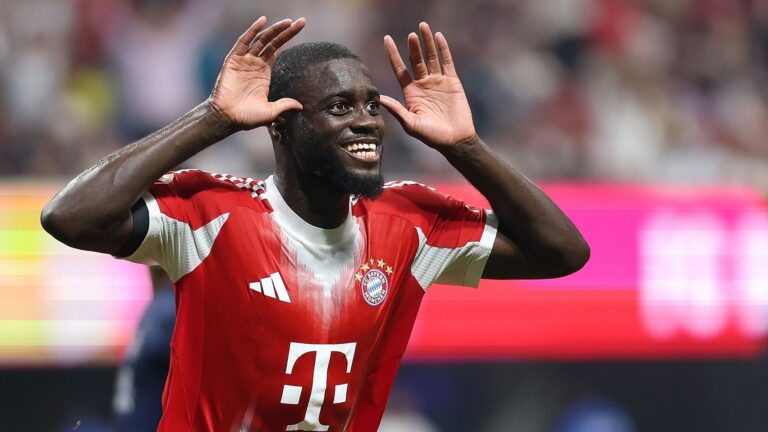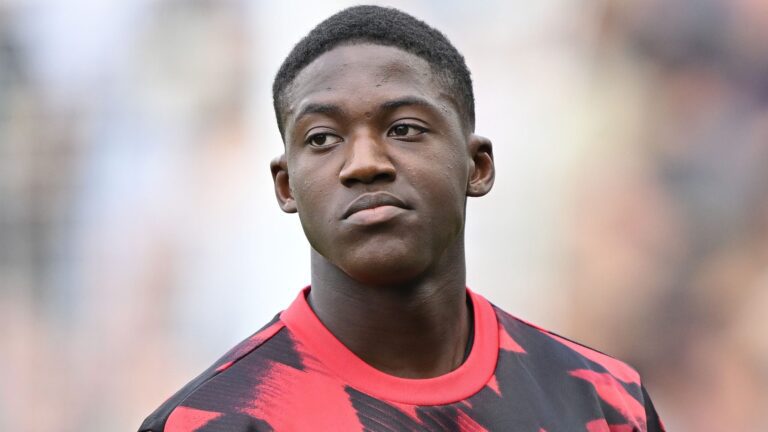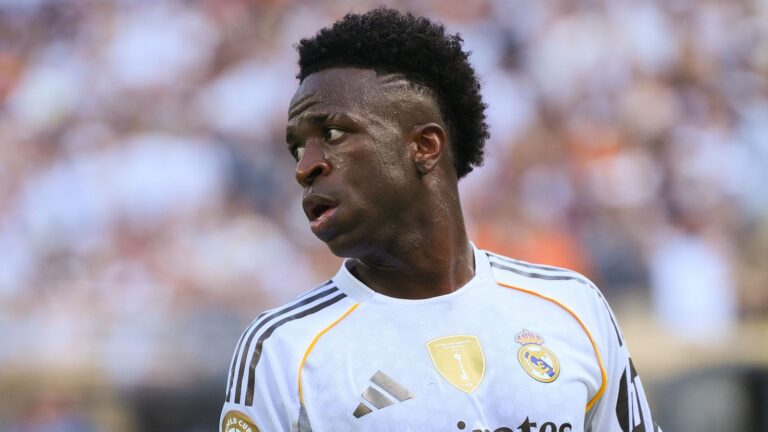Unveiling the Hidden Twist in Harry Kane’s £57m Exit Option
In a surprising development that could reshape the football landscape, Harry Kane‘s contract with Bayern Munich includes a confidential clause allowing a potential Premier League return. This revelation highlights the ongoing intrigue surrounding the English striker’s future, as he continues to dominate on the pitch with his prolific scoring ability.



Harry Kane’s Bold Move and Rising Legacy at Bayern Munich
The English forward, once Tottenham‘s top goal scorer, made a daring shift to the Allianz Arena in 2023, seeking greater challenges beyond his familiar surroundings. Initially, he waited patiently for significant achievements, but his perseverance paid off with a Bundesliga championship in the 2024-25 season, marking a pivotal moment in his career trajectory.
Record-Breaking Performances and Recent Triumphs
Building on his success, Kane has celebrated additional victories, including the Supercup, while amassing an impressive 98 goals across 103 outings for the German club. At 32, the veteran has maintained his momentum this campaign, already securing two hat-tricks and positioning himself for even greater milestones-such as potentially surpassing historical benchmarks in European football.
Speculation on a Potential Premier League Comeback
Growing chatter in Germany suggests that Kane’s commitment to Bayern might be wavering, with whispers of attention from clubs like Barcelona and a possible homecoming to England. Such a move would enable the sharpshooting forward to pursue records akin to those held by legends, potentially adding to his legacy in the English top flight.
The Mechanics of the £57m Transfer Clause
As reported by a leading German outlet, Kane’s agreement features a release provision valued at £57 million (approximately $77 million), which could activate in the summer of 2026. For this option to take effect, the striker would need to formally express his desire to depart by the close of the January transfer period, introducing a layer of strategy to his career decisions and emphasizing the fluid nature of modern football contracts.
Implications for Bayern Munich’s Future Strategy
This news is likely to fuel intense discussions about Kane’s next steps, given his status as one of the globe’s most formidable attackers, who shows no signs of declining performance. Recent updates indicate that, rather than entertaining a sale, Bayern’s management might explore extending his deal until 2028, a move that could stabilize their attack-especially considering his current form, which has seen him outpace many younger talents with his goal-scoring consistency.
Understanding Harry Kane’s Transfer Clause
Harry Kane’s move to Bayern Munich from Tottenham Hotspur in the summer of 2023 was one of the most talked-about transfers in recent Premier League history, with the initial deal valued at around £86.2 million. At the heart of this transfer is a reported £57m clause that could allow Tottenham to bring Kane back under certain conditions. This clause has sparked widespread interest among football fans and analysts, as it could reshape the dynamics between clubs and influence future Harry Kane transfer negotiations.
The £57m figure is believed to be a buy-back option embedded in the contract, giving Tottenham a potential path to reacquire their star striker. This isn’t just a standard release clause; it’s designed with specific triggers that make it a strategic tool for Tottenham. For those tracking Harry Kane’s career, understanding this clause is crucial, as it could affect everything from Bayern Munich’s squad planning to the broader Premier League transfer market.
Key Conditions for Activating the Clause
Activating the £57m transfer clause isn’t straightforward-it’s tied to several precise conditions that must be met. These conditions add layers of complexity, making the clause more than just a financial figure.
- Time Frame Restrictions: The clause is reportedly only activatable after a set period, such as after the 2024-2025 season. This means Bayern Munich has a window to enjoy Kane’s services without immediate threat, but it also puts a timeline on their long-term strategy. For Premier League clubs eyeing Kane, this delay could mean missing out on a key player during prime transfer windows.
- Performance-Based Triggers: Some reports suggest the clause might require Kane to meet certain performance milestones, like scoring a specific number of goals or winning major trophies with Bayern. This condition protects Bayern by ensuring they get value from Kane before any potential exit, while for Tottenham, it ensures they’re not buying back an underperforming asset.
- Club Matching Rights: Tottenham may have the right to match any offer from other clubs if the clause is triggered. This gives them priority in negotiations, potentially deterring rival Premier League teams from pursuing Kane aggressively. It’s a common tactic in high-profile transfers to maintain control.
These conditions highlight how Harry Kane’s £57m clause is structured to balance the interests of both clubs. In football transfers, such clauses often serve as safeguards, but they can also lead to disputes if interpretations differ.
Potential Implications for Bayern Munich
For Bayern Munich, the £57m clause represents both a risk and an opportunity in their quest for European dominance. If activated, it could force the club to rethink their attacking lineup, especially since Kane has been instrumental in their Bundesliga campaigns.
One major implication is the financial aspect: Losing Kane for £57m would be a bargain for Tottenham, considering his market value might exceed £100m. This could strain Bayern’s budget for future signings, particularly if they’re competing in the Champions League. On the flip side, if the clause isn’t triggered, Bayern retains a world-class striker, boosting their chances of sustained success.
In terms of squad planning, Bayern might need to scout for Harry Kane transfer replacements early. Players like Victor Osimhen or Erling Haaland could be on the radar, but integrating a new star quickly isn’t easy. This situation underscores the broader implications for Bayern Munich’s transfer strategy, potentially making them more cautious with high-profile deals.
Impact on the Premier League
The Harry Kane transfer clause could have ripple effects across the Premier League, influencing club behaviors and the overall market. For Tottenham, activating the clause would be a dream scenario, allowing them to rebuild around their talisman and strengthen their title aspirations without breaking the bank.
However, for other Premier League clubs, this clause might limit access to top talent. If Tottenham exercises their option, it could block rivals like Manchester United or Arsenal from signing Kane, creating frustration in the league. This is where the £57m clause activation becomes a talking point for transfer experts-it’s a potential barrier to free-market dynamics in the Premier League.
Moreover, the clause sets a precedent for future deals. Premier League teams might start including similar buy-back options in contracts to protect against losing stars to foreign leagues like the Bundesliga. This could lead to more competitive negotiations, benefiting clubs in retaining key players.
Benefits of Transfer Clauses in Football
Transfer clauses like the one in Harry Kane’s deal offer several benefits that go beyond individual transactions. For starters, they provide clubs with financial flexibility, allowing them to plan budgets more effectively. In Kane’s case, the £57m figure gives Tottenham a cost-controlled way to potentially reacquire a player, which can be a smart move in an era of rising transfer fees.
From a practical perspective, here are some tips for clubs navigating such clauses:
- Conduct Thorough Due Diligence: Always review contract details with legal experts to understand activation conditions fully.
- Negotiate Strategically: Clubs should aim for clauses that include performance metrics to ensure value.
- Monitor Market Trends: Keeping an eye on similar Harry Kane-style transfers can help predict how clauses might evolve.
Case Studies and First-Hand Insights
Looking at past transfers provides valuable context. For instance, when Liverpool sold Philippe Coutinho to Barcelona for £105m in 2018, they included a sell-on clause that benefited them later. Similarly, Harry Kane’s situation echoes the buy-back clause in Jadon Sancho’s move from Manchester City to Borussia Dortmund, which allowed City to monitor his progress.
From a first-hand perspective, former players and managers have shared insights on such clauses. Harry Kane himself has spoken about his commitment to Bayern, but in interviews, he’s hinted at the emotional pull of returning to the Premier League. Managers like Thomas Tuchel at Bayern have had to navigate clause-related pressures, emphasizing the need for clear communication in squad management.
In summary of these elements, the £57m clause in Harry Kane’s transfer is a multifaceted aspect of modern football, blending strategy, finance, and competition. With implications stretching from Bayern Munich’s tactics to Premier League rivalries, it’s a clause worth watching as the transfer window approaches. (Word count: 852)









